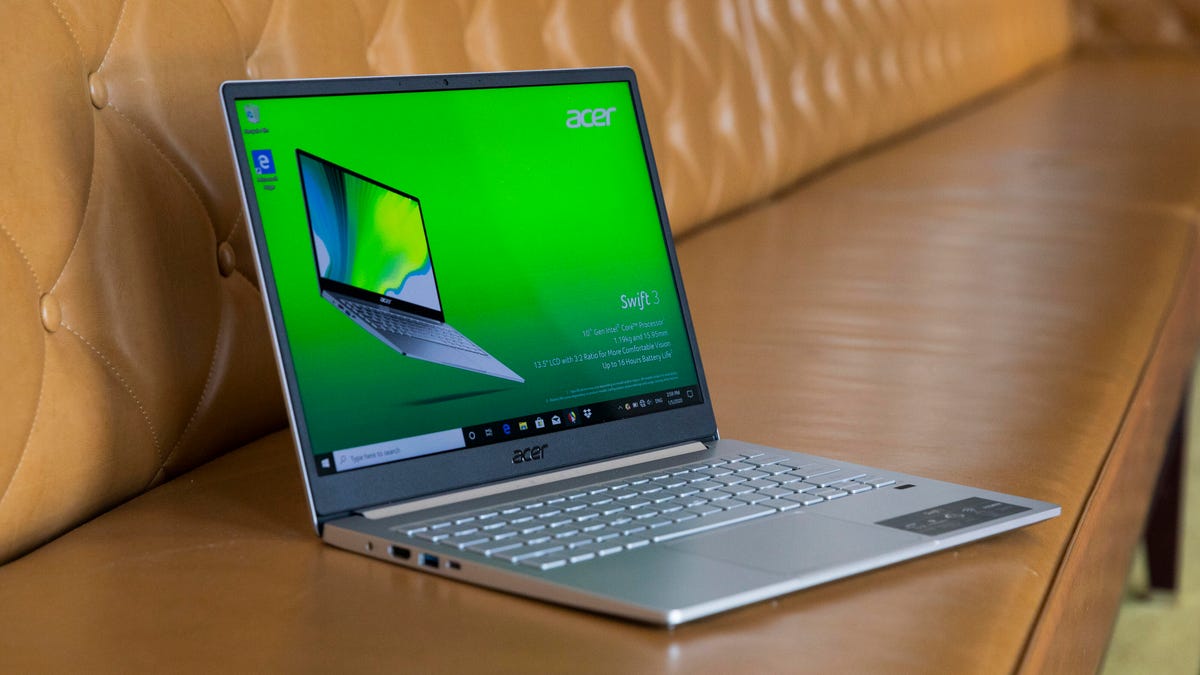 Why You Can Trust CNET
Why You Can Trust CNET These are the Project Athena laptops Intel hopes will change how you work
Using real-world experiences under realistic conditions, Intel wants your next laptop to measure up to what PC makers promise.

Acer's new Swift 3 was one of several Project Athena laptops announced at CES 2020.
Intel's Project Athena is the chipmaker's attempt to make sure you're never skeptical of or disappointed by a PC maker's battery life or performance claims for a new laptop. Announced at Computex 2019, the program takes the focus off the industry-standard benchmarks manufacturers usually use to market laptops and instead has Key Experience Indicators (KEIs) for real-world use. That way you have a better idea of how a laptop will perform under realistic conditions.
To qualify for the program, Intel co-engineers the PCs with manufacturers to meet or exceed the KEIs, which generally speaking are designed to give you the same sort of experience from your laptop as you've come to expect from your phone. First-gen models do need to have certain hardware specs to qualify -- 10th-gen Intel Core i5 or i7 processor, 8GB or more memory and 256GB or more NVMe SSD storage -- but Project Athena is more about using that hardware to meet specific experiences.
- Wake from sleep in less than a second with the press of a power button, lifting the laptop lid or face/fingerprint recognition.
- Consistent responsiveness on battery.
- Adaptive Intelligence that learns how you work and automatically adjusts for performance needs.
- 16 or more hours of local video playback on battery and 9 or more hours of real wireless web browsing.
- Fast charge via USB-C delivering at least 4 hours of battery in 30 minutes.
- Thunderbolt 3, Wi-Fi 6 and optional Gigabit LTE connectivity.
- Ultraslim two-in-one or traditional clamshell designs with touchscreens and narrow bezels on at least three sides.
- Far-field microphones, backlit keyboard, precision touchpad and pen support.
Unfortunately, these requirements don't extend to all laptops or two-in-ones running on Intel's latest processors, just the ones that are Project Athena verified. We still have a long way to go before every portable PC you consider buying has a set of KEIs backing it up, whether you're spending $500 or $1,500. On the other hand, Intel promised at least 50 models by the end of 2020, with several announced at CES 2020 and coming more sooner rather than later.
Dell's XPS 13 for 2019 met Intel's Athena requirements and so does its update announced for CES 2020. One of our favorite ultraportables, the XPS 13 was already incredibly small, but Dell managed to shave even more off the body while simultaneously making the screen slightly larger.
HP only announced its ultralight Elite Dragonfly business two-in-one back in September, but it's already moved on to its second-gen version, the Elite Dragonfly G2. The G2 will have three new key options when it's expected to be available in mid-2020: An improved Sure View privacy display, built-in Tile support for smart location tracking of the device and the option for 5G wireless.
It wasn't long ago that the ThinkPad X1 Carbon Gen 7 started shipping, but Lenovo used CES 2020 to announce its successor. Not too much has changed from the last model, though it does now have Intel's 10th-gen processors, including a six-core Core i7. The 14-inch business laptop is now available with an optional 500-nit panel with Lenovo's PrivacyGuard, which makes it more difficult for people off to the sides of your screen to see what's on it.
Also, though it's not officially official yet, Lenovo says it expects this model to be Athena verified.
Samsung, Google and Intel joined to create one of the first Chromebooks to be Athena verified. Built from aluminum and only 0.4-inch (9.9mm) thick, the $1,000 13.3-inch two-in-one weighs just 2.2 pounds (1 kg) and features a 4K UHD-resolution AMOLED display -- a first for Samsung. The electronics giant says it will even support the HDR400 standard with a software update sometime after its launch in the first quarter of 2020.
Hate 16:9 widescreen laptops? The new 13.5-inch Swift 3 (SF313-52/G) has a tall 3:2 aspect ratio 2K-resolution display, so you can spend more time working and less time scrolling.
Don't let the clunky model name fool you: The B9450 is one sleek-looking laptop. It's the "world's lightest 14-inch business notebook," Asus says, with a starting weight of 1.9 pounds (0.9kg). Along with being light, the magnesium-lithium alloy body is tested to Mil-Spec 810G standards for drops, shocks, vibration, dust resistance and more.
Though it wasn't part of Intel's initial Project Athena announcements, Lenovo says its 13-inch Flex 5 Chromebook two-in-one is now part of the Project Athena program. It will have a water-resistant backlit keyboard, Wi-Fi 6 and up to 10 hours of battery life. It weighs in at just 3 pounds, too (1.4kg). It's expected in June for around $360.
Acer's Athena-verified business ultraportable weighs in at only 2.4 pounds (1.1kg), but the slim 14-inch laptop is Mil-Spec 810G- and 810F-compliant, allowing it to withstand getting banged around on business trips. It'll be available in multiple configurations starting at $1,150 when it's available in February.
If you've been unimpressed with the performance from Chromebooks, you'll want to hunt down one of the Project Athena-verified models like the Samsung and Lenovo above, as well as this Asus. You're guaranteed to find the same caliber of components you'd find in a premium Windows two-in-one -- atypical for Chromebooks. And, along with having USI active pen support with 4,096 levels of pressure, it's one of the rare Chromebooks with a fingerprint reader -- built into the power button -- for unlocking it without a password.
See also
- CNET's 20 favorite products of CES 2020
- All the cool new gadgets at CES 2020
- Full coverage of CES 2020

